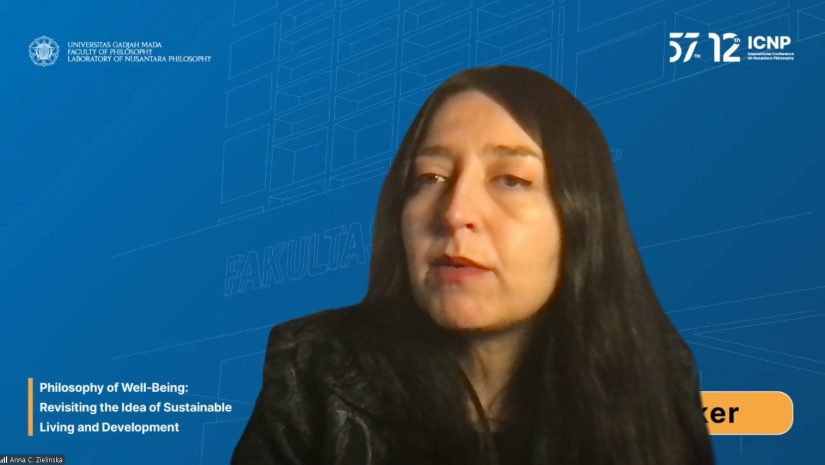
The Faculty of Philosophy at Universitas Gadjah Mada (UGM) successfully hosted the 12th International Conference on Nusantara Philosophy (ICNP) on November 25-26, 2024. Conducted online, this year’s conference centered on the theme “Philosophy of Well-Being: Revisiting the Idea of Sustainable Living and Development.”
The event brought together academics, researchers, and practitioners from diverse fields to discuss and seek a philosophical framework for sustainable development and societal well-being. A key focus of the conference was incorporating indigenous perspectives into the discourse on development while critically examining how such perspectives are often excluded from public policy and knowledge construction.
In her opening address, the Dean of the Faculty of Philosophy at UGM, Dr. Rr. Siti Murtiningsih, underscored the significance of the conference. “This year’s theme invites us to critique the narratives surrounding sustainable development. We must ask ourselves: who defines well-being? Does it truly reflect the collective aspirations of society, or is it imposed through state legitimacy?” she remarked. The Dean emphasized the need for a more inclusive vision of development that respects indigenous knowledge, cultural diversity, and ecological responsibility.
The conference posed crucial questions, such as whether the concept of “sustainable development” aligns with indigenous perspectives on well-being. Should indigenous cultures merely be viewed as “romantic monuments” to be preserved, or can they actively contribute to modern discussions on development? Can indigenous knowledge, which emphasizes ecological balance and cultural preservation, coexist with development agendas focused on economic growth?
Additionally, the conference highlighted the importance of epistemic justice, advocating for the inclusion of indigenous knowledge, ethics, and worldviews in public policy-making. It called for amplifying indigenous communities’ voices in shaping development policies that directly impact their futures.
The conference featured distinguished keynote speakers from leading universities worldwide, including Dr. Lauren Traczykowski from Aston University (UK), Prof. Dr. Gary van Klinken from the University of Amsterdam, Dr. Anna C. Zielinska from Université de Lorraine, Prof. Dr. Michaela Huang from Albert-Ludwigs Universität Freiburg, and Prof. Mukhtasar Syamsuddin from the Faculty of Philosophy at UGM. These speakers shared insights on the intersections between philosophy, sustainability, and public policy, as well as how indigenous perspectives can contribute to more inclusive and sustainable governance.
The conference covered a wide range of sub-themes, including Indigenous Philosophy, Indigenous Psychology, Well-Being, Indigenous Law, Indigenous Ethics, Indigenous Knowledge, Indigenous Public Policy, Epistemic Justice, Fair Energy Transition, and Indigenous Religions. These discussions encouraged interdisciplinary dialogue, inviting experts and practitioners from fields such as sociology, anthropology, political science, law, environmental studies, and beyond to contribute to debates on applying indigenous perspectives in sustainable development policies.
A primary goal of the 12th ICNP was to create a space for re-examining and critiquing the prevailing narratives of sustainable development. Participants were encouraged to challenge existing paradigms, fostering the hope of establishing more inclusive and equitable frameworks that recognize the contributions and rights of indigenous communities.
Through this conference, the Faculty of Philosophy at UGM reaffirmed its commitment to advancing Nusantara Philosophy and promoting interdisciplinary dialogue. These efforts aim to contribute to more sustainable and equitable development practices rooted in a deeper understanding of well-being and the values embedded in diverse philosophical traditions.
The proceedings from the conference, including accepted papers, are set to be indexed in prominent academic platforms such as Crossref, Dimensions, DOAJ, and Google Scholar. This ensures that the discussions and findings from ICNP will continue to enrich the global discourse on sustainable development and indigenous knowledge systems.
